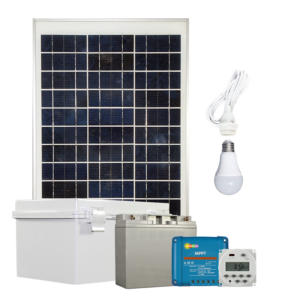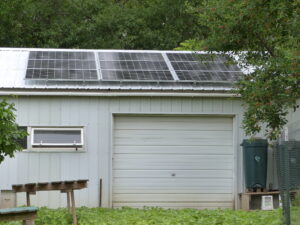Like many people with a small flock of backyard chickens, we faced a dilemma.
Our birds are housed in a coop built inside a pole barn. There was no electric power in our barn.

The chickens kept on laying eggs.
Fall’s Shortening days signals chickens to slow egg production just as many families need plenty of eggs for the holiday baking season. Placing a timer-controlled light in the coop, set to come on early each morning, gives chickens the optimal 15 hours of combined artificial and natural light they need to keep laying.
Lights and timers need electricity that our barn lacked. So, years ago, we hired an electrician to trench a wire from our house to the barn and add outlets and overhead lights. It works fine but the electrician’s bill was stiff and our chicken lights add to our monthly power bill. Now there’s a less expensive option.
P.S. The Holidays are coming….This might be a great gift for chickens and caregivers!
- After trenching the wire was laid down.
- We hired a company to install solar panels on the barn roof.
- Solar powers our home and the light needed for the coop.
Batteries, light bulbs, and solar collectors have become much more efficient and less expensive. It’s now easy to purchase a solar electric system to power outbuildings that lack electricity.
Alternative Light Options
Big box stores sell security lights that include a solar collector, occupancy sensor, battery, and light bulb. The collector creates electricity during the day that charges the battery. The sensor recognizes when a person approaches in the dark and turns on the light. These are fine for their intended purpose but don’t work to add a few extra hours of timer-controlled light for chickens.

A portable solar kit costs around $400, is easy to install and to light your way. (Courtesy Solar Illuminations)
We recently learned of a company called Solar Illuminations, which can create lighting solutions for chicken coops and other outbuildings. A kit including a solar collector, battery, timer, fixture, and the bulb is just over $400. Sounds expensive but likely is less costly than hiring an electrician to run a wire. And, the sun never sends a bill for electricity generated by a solar panel.
Installing a system is easy and doesn’t require an electrician. Systems can also be designed to power an aquarium aerator that will help keep drinking water unfrozen on cold nights or provide work light in an outbuilding.
We love modern technology’s ability to harness the sun’s energy to give hens a few extra hours of light during winter’s darkness. The result is more eggs without adding a penny to the monthly electric bill.
*Note: Winding Pathways received no special compensation or materials from companies in writing this blog.




